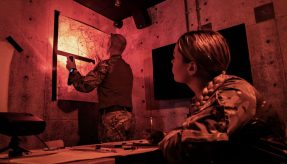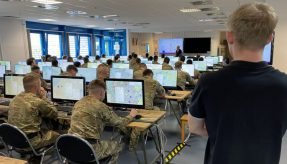
Novatech has supplied the Royal Navy Reserves (RNR) with their RHIB training simulator technology.
The RHIB training simulator technology is designed to train reservists in search and rescue and reconnaissance and was developed alongside the University of Portsmouth. The project, led by students from the RIGPR unit at the University of Portsmouth and Petty Officer Neil Sutton of the Royal Navy was initially developed on a 2 DoF (Degrees of Freedom) simulator chair, with a gaming style steering wheel, thruster and Oculus Rift headset.
Following a trial conducted by a Royal Navy coxswain, the motion simulator was deemed a realistic and efficient training sim alternative. Trainees are pitted in various training scenarios within a realistic VBS3 VR environment, allowing RNR trainees to train within realistic and uncontrollable environmental conditions that they will be facing on the water.
Course Leader of Computer Games Enterprise at the University of Plymouth, Ted Turnbull, said: “Starting with a connection made at DSET 2018, it was apparent that the opportunities offered by the hardware provided by Novatech met some specific interests put forward by the Royal Navy. From a development perspective, working with Novatech has been a very streamlined and positive process for everyone involved.”
“As an introduction to the complexities of working with multiple external partners, it realistically couldn’t have been better and has been an excellent first experience for the student developers working directly on the prototype.”
The goal of the project between the University of Portsmouth and the Royal Navy has been to incorporate gaming technology to enhance and evolve existing training processes. This advanced RHIB simulator will explore the use of force feedback in powerboat training and potentially allow RNR and Royal Navy users to gain a stronger sense of the RHIB’s performance in action.
If you would like to join our community and read more articles like this then please click here.
Navy Plymouth reconnaissance Royal Naval Reserve (RNR) simulator Training VR








